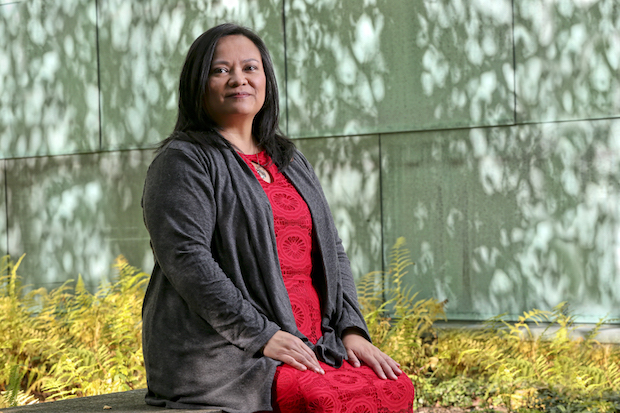'Writing is power, but it is also a form of love:' A Q&A with writer in residence Grace Talusan
 Photo/Mike Lovett
Photo/Mike LovettGrace Talusan
Fannie Hurst Writer in Residence Grace Talusan's stories seem made for this moment, and they are being recognized for it.
Her memoir, "The Body Papers" tells Talusan's life story as an immigrant who came to Boston from the Philippines with her parents when she was two years old. It chronicles emotional and physical trauma, racism, and a return to her roots in the Philippines. Her fiction short story, "The Book of Life and Death,” is the story of a Filipina immigrant who is an essential worker through the COVID-19 pandemic.
"The Body Papers" is the winner of the Nonfiction Award of the 20th Massachusetts Book Awards, and "The Book of Life and Death" is this year’s Boston Books Festival's One City, One Story selection, and has been distributed free of charge throughout the city and online.
Talusan took some time to answer questions with BrandeisNow:
Sections of "The Body Papers" have different styles, and they come together in interesting, powerful ways. Did you know you were working on a memoir from the beginning?
I didn't even think I was working on a book. I was working on different things - essays, even a bit of magazine journalism. We started editing the book first as a collection of essays, then a memoir-in-essays. Eventually, my editor felt confident we could call it a memoir, but I didn't make it in a way that one would make a traditional memoir.
I was interested in exploring how there are different modes and purposes for writing. I saw there might be a way to have these pieces echo each other. Some of the pieces, for example the travel writing, use different narrative versions of me, highlighting different voices and personas, but I am all of those personas.
I didn't do it intentionally from the beginning, but I hoped once we put everything together that it would feel like the same person wrote all of these things and that you could sense the same persona in all of them.
What does it mean to you to get the kind of recognition you are receiving in Boston and Massachusetts, as a person of color who lives and grew up in the area? Boston is a majority racial minority city, but those stories don't often get a lot of attention.
I never expected to get these two different honors for my writing, especially at the same time. When I saw the long list for the Massachusetts Book Awards, I was delighted that my book was on it, but never imagined that my book would win. Same for the Boston Book Festival’s One City, One Story, I've been reading those free pamphlets since it started, but never expected mine would be one of them.
And part of the reason I never expect to win is the lack of visibility and representation of writers and artists of color. Yes, Boston is majority-minority in terms of population, but in terms of cultural visibility, you wouldn't guess that.
I participate in the literary world in Boston and I've noticed that reading events are often predominantly white, unless the event is intentionally for people of color.
So these honors were a wonderful, unexpected surprise. For One City One Story, my story is distributed for free all over the city, and it is being translated into several languages. My hope is that someone, perhaps an immigrant or person of color, who doesn't regularly read short fiction will pick up the free pamphlet of "The Book of Life and Death" and find something to connect to in the story of Marybelle, the Filipina domestic worker at the center of the narrative.
How does your work as an active writer inform your instruction with students?
When working one-on-one with students, or when I'm writing feedback for them, I try to mimic the kind of relationships that I have with my editors. I ask students what their goals are, then I approach helping them or giving them feedback the way that my editors work with me.
Why is writing your passion?
There are pictures of me writing before I could even read, even though I'm sure I was just pretending, so I've been drawn to writing for a long time. I'm more comfortable writing than speaking. Writing is my mode of being able to express certain things I could never say. Writing is power, but it is also a form of love.
Categories: Arts, Humanities and Social Sciences





